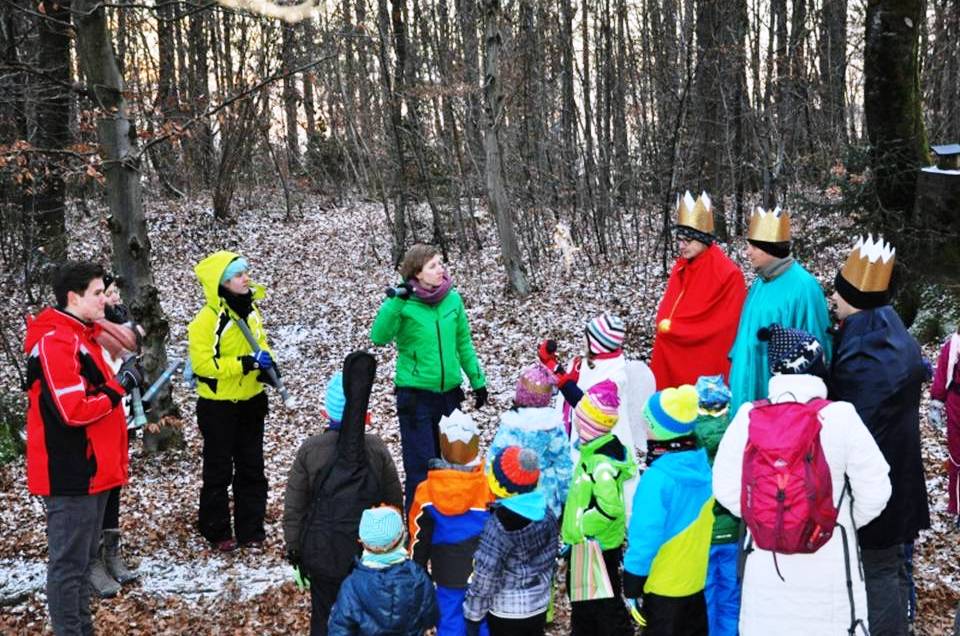
Feb 2, 2017 | Non categorizzato
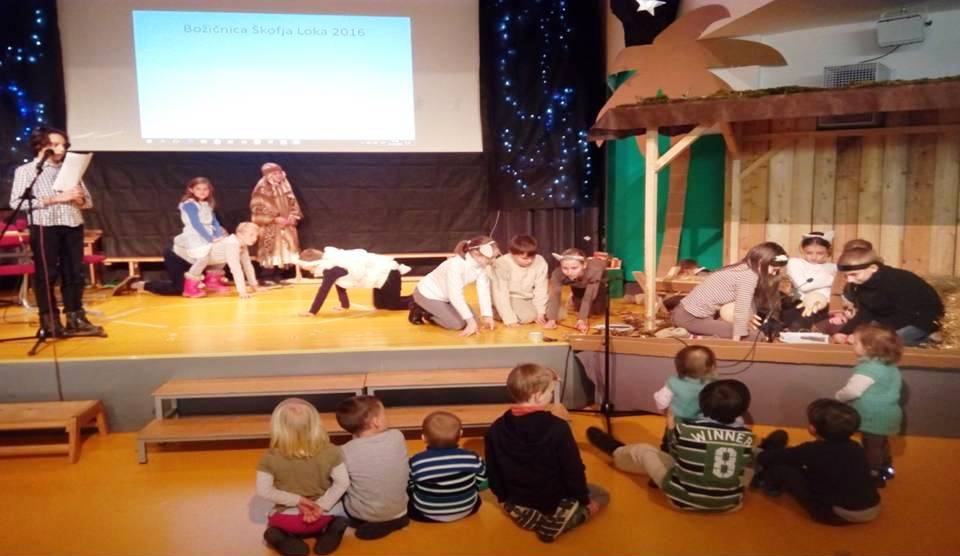 In Slovenia, the Christmas atmosphere is felt already in the first days of December. Many in the Focolare community have learned to make advent wreaths which they sell and then allocate the revenues to social purposes. The feast of St. Nicholas is on 6 December and he goes around with sacks full of gifts on this day. It is an occasion in which families in need are able to experience the fantasy of Divine Providence, through the collection and redistribution of all the surpluses of many families. In the exchange, some detach themselves from objects they are attached to sentimentally, which become gifts for the others, and everyone experiences the typical joy that arises from ”giving.” And while some members of the various communities deliver the proceeds of the wreaths to humanitarian actions in the territory, as they do every year, the Youth for a United World gather at the Arche (the Movement of Jean Vanier) for a unique sharing experience. In other districts, they visit the centre for single mums, bringing joy and warmth to all. The dates of these initiatives are first published on Facebook, extending the invitation to other youths to go out together to gather and distribute gifts.
In Slovenia, the Christmas atmosphere is felt already in the first days of December. Many in the Focolare community have learned to make advent wreaths which they sell and then allocate the revenues to social purposes. The feast of St. Nicholas is on 6 December and he goes around with sacks full of gifts on this day. It is an occasion in which families in need are able to experience the fantasy of Divine Providence, through the collection and redistribution of all the surpluses of many families. In the exchange, some detach themselves from objects they are attached to sentimentally, which become gifts for the others, and everyone experiences the typical joy that arises from ”giving.” And while some members of the various communities deliver the proceeds of the wreaths to humanitarian actions in the territory, as they do every year, the Youth for a United World gather at the Arche (the Movement of Jean Vanier) for a unique sharing experience. In other districts, they visit the centre for single mums, bringing joy and warmth to all. The dates of these initiatives are first published on Facebook, extending the invitation to other youths to go out together to gather and distribute gifts.  The smaller ones instead organise themselves in the streets to offer the little statues of Baby Jesus, that they have handcrafted themselves. It is not a sale, but an awareness campaign to bring the focus to the real protagonist of Christmas. But many leave offerings which they devolve to poor children. This is why they choose the big malls as the location for their campaign, as well as the homes for the aged, of relatives and next-door neighbours, and the midnight masses. In one of the towns, also the mayor went to visit. In a shopping centre, the Gen 4, and bigger kids (Kids for Unity) held a Christmas flashmob, giving a hand to the smaller ones who were thus able to distribute their 125 statuettes. In 18 Slovenian districts, there was also a fixed date for Christmas preparations. The entire community gathered together, with the participation of around 1,300 people, among whom was also a bishop. One of the communities wanted to pass the Epiphany together, and went to visit Baby Jesus in an old church on the hill. The group was accompanied along the trails in the woods by the Magi who also wanted to follow the star. Along the way they came across Herod who begged the Magi to return to him once they had found the Child. But suddenly an angel appeared to invite them to take another route home. This was exactly what the whole group did, choosing an alternative path. After this real-life staging, nobody would ever forget how Baby Jesus was saved from the anger of Herod. Of great significance were the Christmas stage plays held in the two Slovenian kindergartens, which drew inspiration from the educational games of unity: “Sun Ray” of Škofja Loka and “Jurček” in Grosuplje. The latter was held in the city’s Cultural Centre. Though many of those present declared to be agnostics, the intense atmosphere engaged them all. They followed the stage play of the Nativity of Jesus with great attention and in the end many joined in the children’s songs, and no longer wanted to leave.
The smaller ones instead organise themselves in the streets to offer the little statues of Baby Jesus, that they have handcrafted themselves. It is not a sale, but an awareness campaign to bring the focus to the real protagonist of Christmas. But many leave offerings which they devolve to poor children. This is why they choose the big malls as the location for their campaign, as well as the homes for the aged, of relatives and next-door neighbours, and the midnight masses. In one of the towns, also the mayor went to visit. In a shopping centre, the Gen 4, and bigger kids (Kids for Unity) held a Christmas flashmob, giving a hand to the smaller ones who were thus able to distribute their 125 statuettes. In 18 Slovenian districts, there was also a fixed date for Christmas preparations. The entire community gathered together, with the participation of around 1,300 people, among whom was also a bishop. One of the communities wanted to pass the Epiphany together, and went to visit Baby Jesus in an old church on the hill. The group was accompanied along the trails in the woods by the Magi who also wanted to follow the star. Along the way they came across Herod who begged the Magi to return to him once they had found the Child. But suddenly an angel appeared to invite them to take another route home. This was exactly what the whole group did, choosing an alternative path. After this real-life staging, nobody would ever forget how Baby Jesus was saved from the anger of Herod. Of great significance were the Christmas stage plays held in the two Slovenian kindergartens, which drew inspiration from the educational games of unity: “Sun Ray” of Škofja Loka and “Jurček” in Grosuplje. The latter was held in the city’s Cultural Centre. Though many of those present declared to be agnostics, the intense atmosphere engaged them all. They followed the stage play of the Nativity of Jesus with great attention and in the end many joined in the children’s songs, and no longer wanted to leave.
Feb 1, 2017 | Non categorizzato
Theme of the Meeting of Bishops, Friends of the Focolare Movement: «If the world knew Him …» Jesus abandoned on the cross: fundament of the spirituality of communion key to a “culture of encounter” For info: segves@focolare.org – and tel.. 06 947 98150
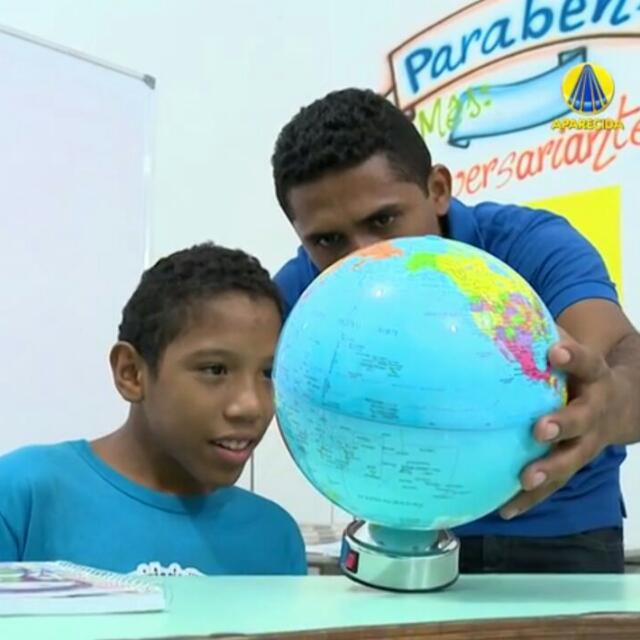
Feb 1, 2017 | Non categorizzato
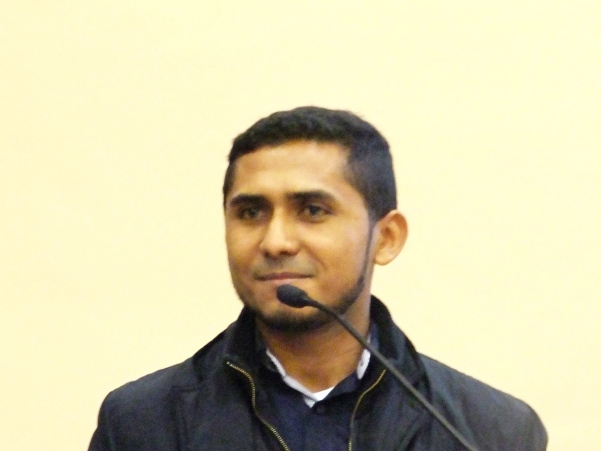 Brazil is a land of contradictions, the emblem of joy, hospitality, folklore, music, pristine nature, beaches, luxorious forests and metropolises oon the one hand. But on the other, like many countries in the world, Brazil is a land of contrasts, criminality and social inequality. Drug traffiking in the city represents a real wound on society that inevitably leads to armed conflicts. In addition, the murder rate among women is high, prostitution, lack of health care, child labour, low level of education, and the spread of slave labour generates high levels of inenquality as in the favellas and in the outlying districts of big cities. Health care and education are not garunteed and young people can’t look forward to an education and a job. Few escape the clutches of cime, thanks mostly to a few public policies and the work of social aid organizations such as parishes and Christian church groups that are really the only ones who have the fate of the poor at heart. Even in my own city with its 800,000 citizens, children between the ages of 13 and 17 have been mudered because of their involvement with drugs. My desire to love my neighbor, to give myself especially to the people that have been rejected by society, led me to be involved for five years, in the spirit of the Focolare, with a social project years in the diocese of Teresina: “The New Youth Community Centre.”
Brazil is a land of contradictions, the emblem of joy, hospitality, folklore, music, pristine nature, beaches, luxorious forests and metropolises oon the one hand. But on the other, like many countries in the world, Brazil is a land of contrasts, criminality and social inequality. Drug traffiking in the city represents a real wound on society that inevitably leads to armed conflicts. In addition, the murder rate among women is high, prostitution, lack of health care, child labour, low level of education, and the spread of slave labour generates high levels of inenquality as in the favellas and in the outlying districts of big cities. Health care and education are not garunteed and young people can’t look forward to an education and a job. Few escape the clutches of cime, thanks mostly to a few public policies and the work of social aid organizations such as parishes and Christian church groups that are really the only ones who have the fate of the poor at heart. Even in my own city with its 800,000 citizens, children between the ages of 13 and 17 have been mudered because of their involvement with drugs. My desire to love my neighbor, to give myself especially to the people that have been rejected by society, led me to be involved for five years, in the spirit of the Focolare, with a social project years in the diocese of Teresina: “The New Youth Community Centre.”  The project, which is geared towards at-risk children and teenagers, tries to provide alternative opportunities. Eighty children and teenagers (betweeen the ages of 5 and 17) attend music, dance and theatre classes. They receive tutoring and are provided with hot meals, since they often don’t find food in their homes. Their lives change when they come into contact with people who welcome and care for them. I also tried to be involved, listening to many young people who have shared their suffering with me. One boy told me about his drug problem and asked me to help him out of the tunnel. Another told me how he steals in order to get money. We often involve the professionals who work there, such as psychologists and social workers. Now many of the children are grown, they study and have found honest work. Others continue to arrive in search of an opportunity at a better life, of being loved and cared for. One of them who had been abandoned by his father, called me “Dad” and so I took on this role One boy had suffered various forms of violence and neglect. We found a way to channel his energy, by introducing him to judo, and that changed him for the better. He became a source of pride for all of us who had helped him. But one day he didn’t show up at the centre. We learned that he had become involved in some ugly ways and, one day, as he sat in front of his house was murdered. He had just turned 15. It was a big suffering for all of us, also for me because of the friendship we had built. Many other teenagers suffer the same fate. The project foresees also moments of training for educators and young people, according to the Chiara Lubich‘s spirituality, with monthly meetings of the Word of Life. What I got out of this experience is that continuity is required for recovering these boys, working in synchrony with the State, public institutions of education and health, with civil society, and with the church. To win this challenge we need to create networks and dialogue at every level: personal, group, community, all the way to the highest levels of society. But it all begins with me, moving beyond myself and going out to encounter the many peripheries. We’ve already begun.
The project, which is geared towards at-risk children and teenagers, tries to provide alternative opportunities. Eighty children and teenagers (betweeen the ages of 5 and 17) attend music, dance and theatre classes. They receive tutoring and are provided with hot meals, since they often don’t find food in their homes. Their lives change when they come into contact with people who welcome and care for them. I also tried to be involved, listening to many young people who have shared their suffering with me. One boy told me about his drug problem and asked me to help him out of the tunnel. Another told me how he steals in order to get money. We often involve the professionals who work there, such as psychologists and social workers. Now many of the children are grown, they study and have found honest work. Others continue to arrive in search of an opportunity at a better life, of being loved and cared for. One of them who had been abandoned by his father, called me “Dad” and so I took on this role One boy had suffered various forms of violence and neglect. We found a way to channel his energy, by introducing him to judo, and that changed him for the better. He became a source of pride for all of us who had helped him. But one day he didn’t show up at the centre. We learned that he had become involved in some ugly ways and, one day, as he sat in front of his house was murdered. He had just turned 15. It was a big suffering for all of us, also for me because of the friendship we had built. Many other teenagers suffer the same fate. The project foresees also moments of training for educators and young people, according to the Chiara Lubich‘s spirituality, with monthly meetings of the Word of Life. What I got out of this experience is that continuity is required for recovering these boys, working in synchrony with the State, public institutions of education and health, with civil society, and with the church. To win this challenge we need to create networks and dialogue at every level: personal, group, community, all the way to the highest levels of society. But it all begins with me, moving beyond myself and going out to encounter the many peripheries. We’ve already begun.
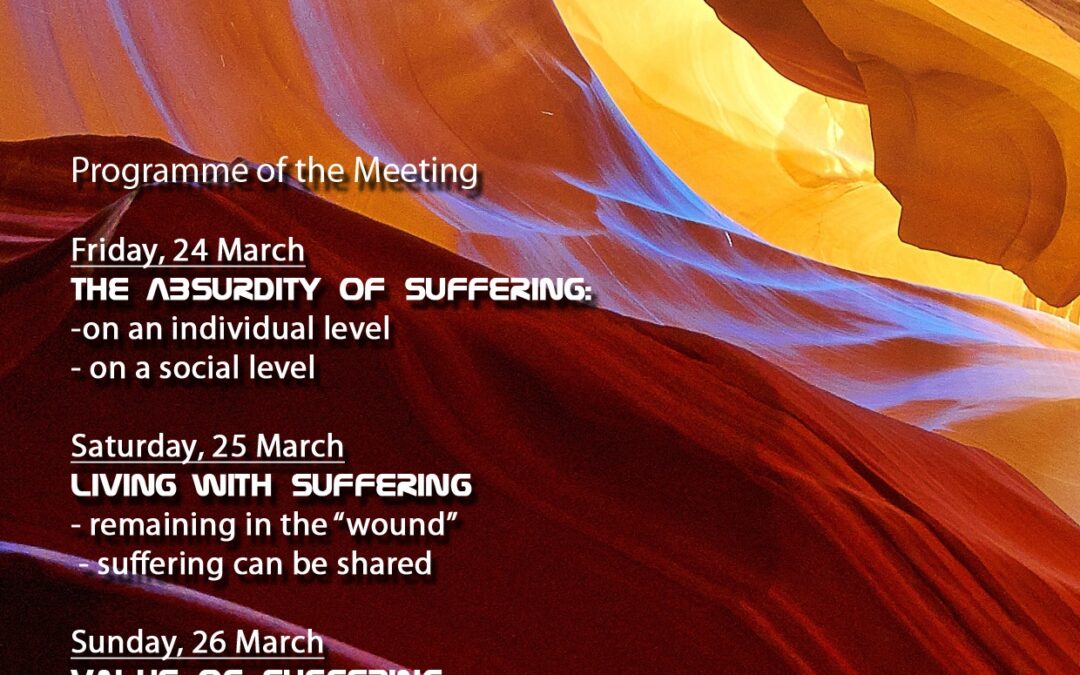
Jan 30, 2017 | Non categorizzato
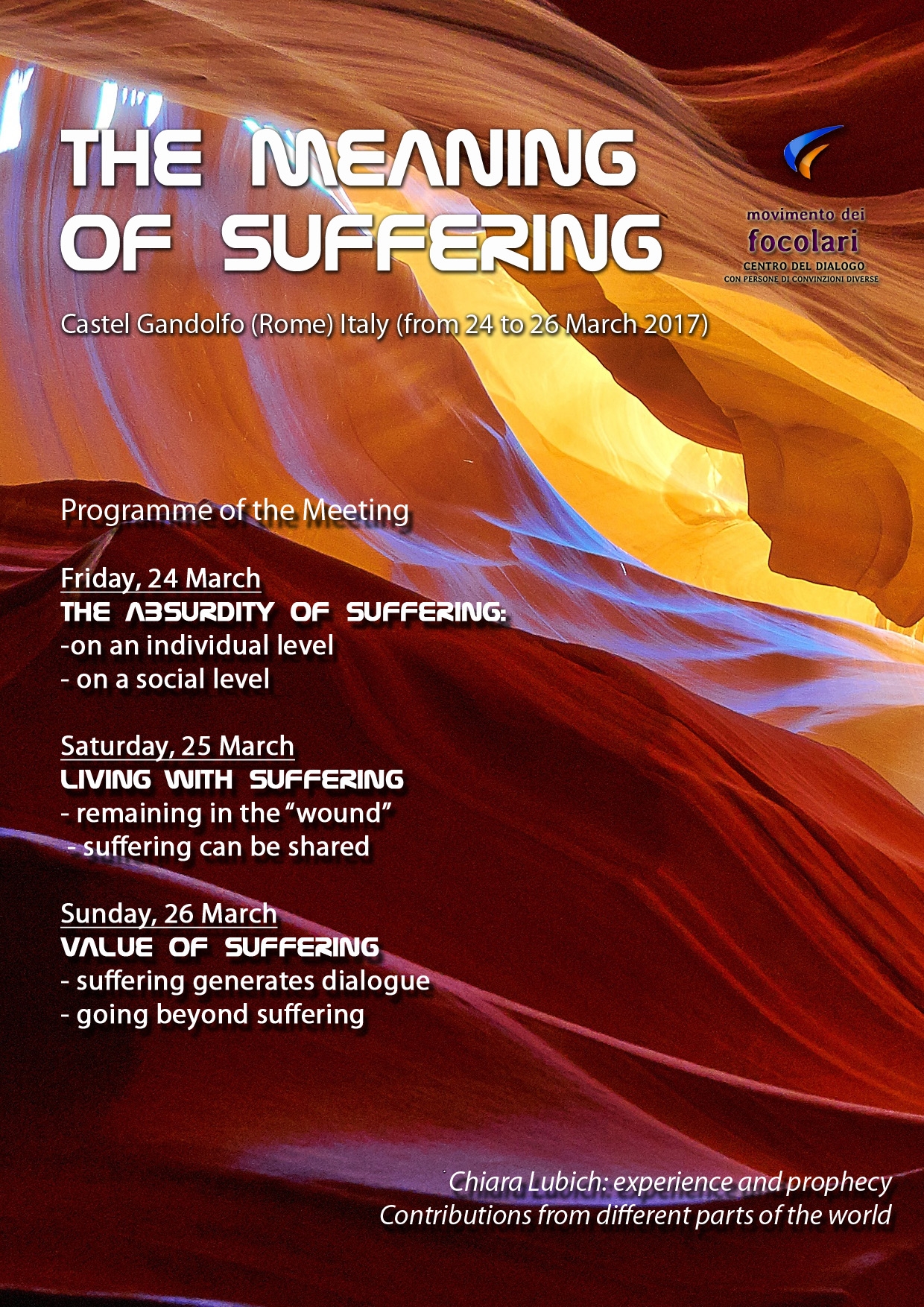 The program will focus on these themes: The absurdity of suffering on an individual and social level Living with suffering The value of suffering There will be input from various geographic regions and from various disciplines: psychology, medicine, philosophy, art, through personal experiences given by people of different age-groups. Bookings can be made through the Centre for Dialogue with Persons of no Religious Affiliation Focolare Movement, Via Frascati 306, 00040 Rocca di Papa (Rome), Italy Email: centrodialogo@focolare.org Tel: +39 06 94798-343
The program will focus on these themes: The absurdity of suffering on an individual and social level Living with suffering The value of suffering There will be input from various geographic regions and from various disciplines: psychology, medicine, philosophy, art, through personal experiences given by people of different age-groups. Bookings can be made through the Centre for Dialogue with Persons of no Religious Affiliation Focolare Movement, Via Frascati 306, 00040 Rocca di Papa (Rome), Italy Email: centrodialogo@focolare.org Tel: +39 06 94798-343
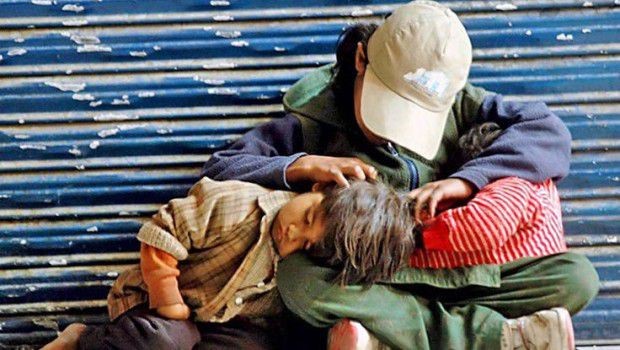
Jan 30, 2017 | Non categorizzato
Eight people own as much as the poorest half of the world’s population. This is what Oxfam Report 2017 says. Runaway inequality is condemning hundreds of millions of people to poverty and highlighting the iniquity of the current economic system. In this complex situation, the Economy of Communion may be considered as a prophetic sign. It originated in May 1991, in Brazil as a reaction to the scandalous situation of the favelas that surround the city of San Paolo. Chiara Lubich invited a first group of entrepreneurs to set up businesses that follow the market laws and produce profits “which would be freely put in common”. Its aim is to help the poor, create jobs and promote the culture of giving as an alternative to the culture of having.  Since then, 25 years have passed. And on Saturday, February 4, 2017, 1100 people involved in the Economy of Communion (EoC) will meet Pope Francis at Paul VI Hall. The majority of them are entrepreneurs, men and women, who chose communion as away of life, personally and also in the running of their businesses. They will be joined by students, scholars and professors, who, through research and academic activity, aim at laying a theoratical foundation to the inspiration economy/communion . These participants come from different countries and various backgrounds, and this shows that the EoC can establish itself in any geographical and cultural environment, rich and poor. Many participants will come from the continent of Asia: China, Korea, the Philippines, Hong Kong, India, Malaysia, Singapore, Thailand and Vietnam. Africa will be presented by participants from Burkina Faso, Burundi, Cameroon, Ivory Coast, Ethiopia, Uganda, Nigeria and the Democratic Republic of Congo. Entrepreneurs from North and South America will come from 11 different countries, namely, Argentina, Bolivia, Brazil, Canada, Chile, Cuba, Mexico, Panama, Paraguay, Uruguay and USA. European participants are many and they come from 20 different countries. Oceania will be present with Australia. Maria Voce, the president of the Focolare Movement together its General Council will also be present. These participants want, first of all, to thank Pope Francis for his teachings and actions that highlight the dignity of the poor and the excluded. At the same time, this assembly would like to present to the Pope some fruits of the EoC, that has been facing challenges and crises that afflict the world since its very start. Today, the EoC animates industrial parks in Europe and Latin America, generates a life of communion in more than eight hundred companies, helps several thousands of people in need and sees to the education of their children, develops a cultural reflection that contributes towards rethinking about economic practices such as reciprocity, gift, gratuity and the idea of market. New projects are also being carried out:
Since then, 25 years have passed. And on Saturday, February 4, 2017, 1100 people involved in the Economy of Communion (EoC) will meet Pope Francis at Paul VI Hall. The majority of them are entrepreneurs, men and women, who chose communion as away of life, personally and also in the running of their businesses. They will be joined by students, scholars and professors, who, through research and academic activity, aim at laying a theoratical foundation to the inspiration economy/communion . These participants come from different countries and various backgrounds, and this shows that the EoC can establish itself in any geographical and cultural environment, rich and poor. Many participants will come from the continent of Asia: China, Korea, the Philippines, Hong Kong, India, Malaysia, Singapore, Thailand and Vietnam. Africa will be presented by participants from Burkina Faso, Burundi, Cameroon, Ivory Coast, Ethiopia, Uganda, Nigeria and the Democratic Republic of Congo. Entrepreneurs from North and South America will come from 11 different countries, namely, Argentina, Bolivia, Brazil, Canada, Chile, Cuba, Mexico, Panama, Paraguay, Uruguay and USA. European participants are many and they come from 20 different countries. Oceania will be present with Australia. Maria Voce, the president of the Focolare Movement together its General Council will also be present. These participants want, first of all, to thank Pope Francis for his teachings and actions that highlight the dignity of the poor and the excluded. At the same time, this assembly would like to present to the Pope some fruits of the EoC, that has been facing challenges and crises that afflict the world since its very start. Today, the EoC animates industrial parks in Europe and Latin America, generates a life of communion in more than eight hundred companies, helps several thousands of people in need and sees to the education of their children, develops a cultural reflection that contributes towards rethinking about economic practices such as reciprocity, gift, gratuity and the idea of market. New projects are also being carried out:
- an international network (Economy of Communion Incubating International Network – EOC-IIN) with hubs in industrial parks (and also in other places) to support young entrepreneurs. These hubs are already functioning in Cameroon, Portugal, Croatia, Mexico and Brazil. 100 young people living in vulnerable situations are being trained through a successfully run partnership in which social and civil economy organizations are involved. Workshops are currently taking place in Portugal and Mexico to train youth in an entrepreneurship “of communion”. Collaboration with academic institutions is also present as, e.g. with the University of Puebla (Mexico) for the development of projects for an indigenous community.
- An Observatory on Poverty that gathers information about the best practices in the struggle against poverty and develops an approach inspired by the values of communion and reciprocity.
These and other topics will be dealt with during the three working conferences to be held from 1-5 February at the Mariapolis Centre of Castelgandolfo (Rome). Tracks and projects for 2018-2020 will be defined. “If we decide to look at the world with the poor and the discarded” says Luigino Bruni, economist and international coordinator of the Economy of Communion, “we cannot stay on the pedestal; we have to come down and be with the victims, we have to fight for them, fight with them. In return, we will get new eyes, we will see things others do not see; sometimes we see horrible things; other times we see things of infinite beauty. The EoC has been doing this for 25 years. If it wants to survive, it must keep on doing it every day, better and more”. Press release Edc online
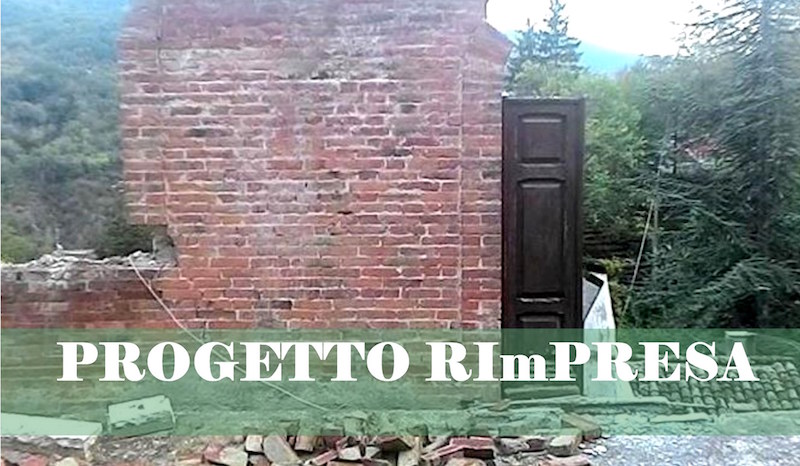
Jan 30, 2017 | Non categorizzato
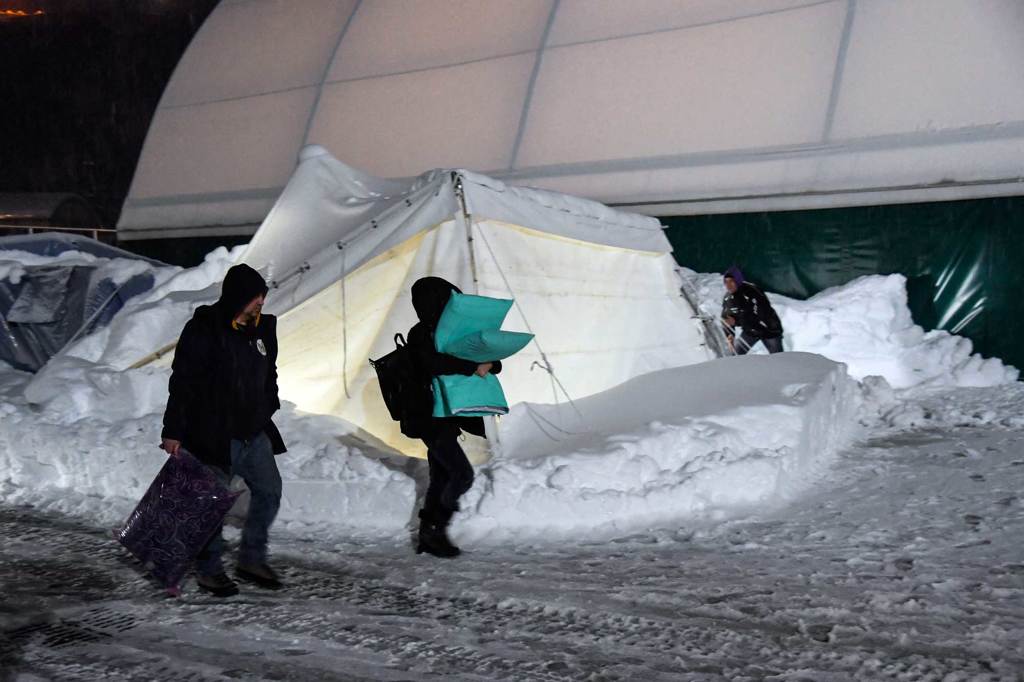 “It’s like being in a war. There are police, civil protection agencies, the Red Cross, and so on. Last night we had supper with a family of six, whose sons are boys scouts with our son. Their house is damaged and their sleeping under the canopy. Our family has grown, but also our hearts. From a tank of gas for those who were without energy to shovelling out a neighbour after the snowfall, we are having an experience of brotherhood. Up until ysterday we were among the ones asking for help. Then the lights came on and we turned out attention towards those who are in need. At the end of our lives we won’t be asked whether we were believers, but whether we were credible!” These are the reports coming to us from our friends that were hit by the latest earthquake which, since last August 24th has been shaking Italy, which is now covered in a thick blanket of snow. The earthquakes have been followed by other earthquakes that have caused avalanches, landslides and loss of life. That was the case for the fire fighters who raced to the hotel that was buried in snow, or the civil volunteers who are here from alll over Italy. The RImPresa Project is also focusing on a particular aspect of the seemingly endless emergency, that is, the support network that for several months has been providing logistical support along the ancient Salaria way, to many small rural centres whose economies are based mainly on agriculture raising livestock.
“It’s like being in a war. There are police, civil protection agencies, the Red Cross, and so on. Last night we had supper with a family of six, whose sons are boys scouts with our son. Their house is damaged and their sleeping under the canopy. Our family has grown, but also our hearts. From a tank of gas for those who were without energy to shovelling out a neighbour after the snowfall, we are having an experience of brotherhood. Up until ysterday we were among the ones asking for help. Then the lights came on and we turned out attention towards those who are in need. At the end of our lives we won’t be asked whether we were believers, but whether we were credible!” These are the reports coming to us from our friends that were hit by the latest earthquake which, since last August 24th has been shaking Italy, which is now covered in a thick blanket of snow. The earthquakes have been followed by other earthquakes that have caused avalanches, landslides and loss of life. That was the case for the fire fighters who raced to the hotel that was buried in snow, or the civil volunteers who are here from alll over Italy. The RImPresa Project is also focusing on a particular aspect of the seemingly endless emergency, that is, the support network that for several months has been providing logistical support along the ancient Salaria way, to many small rural centres whose economies are based mainly on agriculture raising livestock.  The RImPRESA project, which is promoted by the AMU, the AIPEC Business Owners Association, AFN Onlus, Planetary Embrace, B&F Foundation and the Focolare Movement is now in full operation. There are suppliers, raw material businesses, machinery and provisional infrastructure companies, 4 (GAS) purchasing groups from other Italian cities who are all working to create a user and consumption base outside the areas affected by the earthquake. The eighty families involved so far will soon be able to buy the products from the companies through an IT platform that will send their order. The products will be delivered once a week. The intent of GAS – far from providing welfare – is to encourage a reciprocity and involvement by all the participants. The project includes the creation of a “Reciprocity Fund” from which the selected families will receive a grant for the restart of their production activities. They in turn will agree help support businesses, once the condition of their own businesses allow it. For more information: www.amu-it.eu See: Earthquake in Italy: three hours under the rubble “Toulouse for Italy” Concert Christmas among earthquake victims in Centra Italy
The RImPRESA project, which is promoted by the AMU, the AIPEC Business Owners Association, AFN Onlus, Planetary Embrace, B&F Foundation and the Focolare Movement is now in full operation. There are suppliers, raw material businesses, machinery and provisional infrastructure companies, 4 (GAS) purchasing groups from other Italian cities who are all working to create a user and consumption base outside the areas affected by the earthquake. The eighty families involved so far will soon be able to buy the products from the companies through an IT platform that will send their order. The products will be delivered once a week. The intent of GAS – far from providing welfare – is to encourage a reciprocity and involvement by all the participants. The project includes the creation of a “Reciprocity Fund” from which the selected families will receive a grant for the restart of their production activities. They in turn will agree help support businesses, once the condition of their own businesses allow it. For more information: www.amu-it.eu See: Earthquake in Italy: three hours under the rubble “Toulouse for Italy” Concert Christmas among earthquake victims in Centra Italy

 In Slovenia, the Christmas atmosphere is felt already in the first days of December. Many in the Focolare community have learned to make advent wreaths which they sell and then allocate the revenues to social purposes. The feast of St. Nicholas is on 6 December and he goes around with sacks full of gifts on this day. It is an occasion in which families in need are able to experience the fantasy of Divine Providence, through the collection and redistribution of all the surpluses of many families. In the exchange, some detach themselves from objects they are attached to sentimentally, which become gifts for the others, and everyone experiences the typical joy that arises from ”giving.” And while some members of the various communities deliver the proceeds of the wreaths to humanitarian actions in the territory, as they do every year, the Youth for a United World gather at the Arche (the Movement of Jean Vanier) for a unique sharing experience. In other districts, they visit the centre for single mums, bringing joy and warmth to all. The dates of these initiatives are first published on Facebook, extending the invitation to other youths to go out together to gather and distribute gifts.
In Slovenia, the Christmas atmosphere is felt already in the first days of December. Many in the Focolare community have learned to make advent wreaths which they sell and then allocate the revenues to social purposes. The feast of St. Nicholas is on 6 December and he goes around with sacks full of gifts on this day. It is an occasion in which families in need are able to experience the fantasy of Divine Providence, through the collection and redistribution of all the surpluses of many families. In the exchange, some detach themselves from objects they are attached to sentimentally, which become gifts for the others, and everyone experiences the typical joy that arises from ”giving.” And while some members of the various communities deliver the proceeds of the wreaths to humanitarian actions in the territory, as they do every year, the Youth for a United World gather at the Arche (the Movement of Jean Vanier) for a unique sharing experience. In other districts, they visit the centre for single mums, bringing joy and warmth to all. The dates of these initiatives are first published on Facebook, extending the invitation to other youths to go out together to gather and distribute gifts.  The smaller ones instead organise themselves in the streets to offer the little statues of Baby Jesus, that they have handcrafted themselves. It is not a sale, but an awareness campaign to bring the focus to the real protagonist of Christmas. But many leave offerings which they devolve to poor children. This is why they choose the big malls as the location for their campaign, as well as the homes for the aged, of relatives and next-door neighbours, and the midnight masses. In one of the towns, also the mayor went to visit. In a shopping centre, the Gen 4, and bigger kids (Kids for Unity) held a Christmas flashmob, giving a hand to the smaller ones who were thus able to distribute their 125 statuettes. In 18 Slovenian districts, there was also a fixed date for Christmas preparations. The entire community gathered together, with the participation of around 1,300 people, among whom was also a bishop. One of the communities wanted to pass the Epiphany together, and went to visit Baby Jesus in an old church on the hill. The group was accompanied along the trails in the woods by the Magi who also wanted to follow the star. Along the way they came across Herod who begged the Magi to return to him once they had found the Child. But suddenly an angel appeared to invite them to take another route home. This was exactly what the whole group did, choosing an alternative path. After this real-life staging, nobody would ever forget how Baby Jesus was saved from the anger of Herod. Of great significance were the Christmas stage plays held in the two Slovenian kindergartens, which drew inspiration from the educational games of unity: “Sun Ray” of Škofja Loka and “Jurček” in Grosuplje. The latter was held in the city’s Cultural Centre. Though many of those present declared to be agnostics, the intense atmosphere engaged them all. They followed the stage play of the Nativity of Jesus with great attention and in the end many joined in the children’s songs, and no longer wanted to leave.
The smaller ones instead organise themselves in the streets to offer the little statues of Baby Jesus, that they have handcrafted themselves. It is not a sale, but an awareness campaign to bring the focus to the real protagonist of Christmas. But many leave offerings which they devolve to poor children. This is why they choose the big malls as the location for their campaign, as well as the homes for the aged, of relatives and next-door neighbours, and the midnight masses. In one of the towns, also the mayor went to visit. In a shopping centre, the Gen 4, and bigger kids (Kids for Unity) held a Christmas flashmob, giving a hand to the smaller ones who were thus able to distribute their 125 statuettes. In 18 Slovenian districts, there was also a fixed date for Christmas preparations. The entire community gathered together, with the participation of around 1,300 people, among whom was also a bishop. One of the communities wanted to pass the Epiphany together, and went to visit Baby Jesus in an old church on the hill. The group was accompanied along the trails in the woods by the Magi who also wanted to follow the star. Along the way they came across Herod who begged the Magi to return to him once they had found the Child. But suddenly an angel appeared to invite them to take another route home. This was exactly what the whole group did, choosing an alternative path. After this real-life staging, nobody would ever forget how Baby Jesus was saved from the anger of Herod. Of great significance were the Christmas stage plays held in the two Slovenian kindergartens, which drew inspiration from the educational games of unity: “Sun Ray” of Škofja Loka and “Jurček” in Grosuplje. The latter was held in the city’s Cultural Centre. Though many of those present declared to be agnostics, the intense atmosphere engaged them all. They followed the stage play of the Nativity of Jesus with great attention and in the end many joined in the children’s songs, and no longer wanted to leave. 



 The program will focus on these themes: The absurdity of suffering on an individual and social level Living with suffering The value of suffering There will be input from various geographic regions and from various disciplines: psychology, medicine, philosophy, art, through personal experiences given by people of different age-groups. Bookings can be made through the Centre for Dialogue with Persons of no Religious Affiliation Focolare Movement, Via Frascati 306, 00040 Rocca di Papa (Rome), Italy Email:
The program will focus on these themes: The absurdity of suffering on an individual and social level Living with suffering The value of suffering There will be input from various geographic regions and from various disciplines: psychology, medicine, philosophy, art, through personal experiences given by people of different age-groups. Bookings can be made through the Centre for Dialogue with Persons of no Religious Affiliation Focolare Movement, Via Frascati 306, 00040 Rocca di Papa (Rome), Italy Email: 

